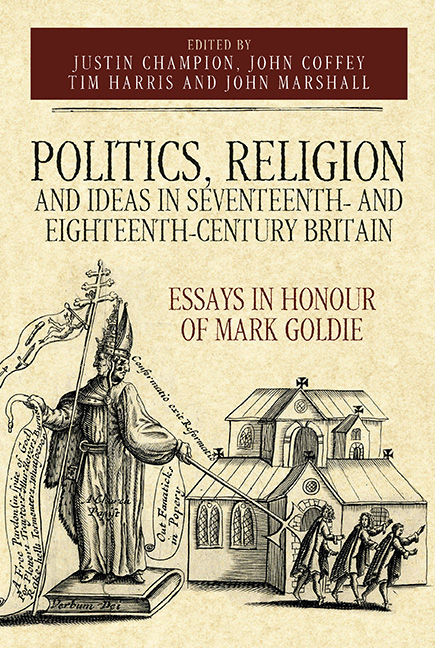 Politics, Religion and Ideas in Seventeenth- and Eighteenth-Century Britain
Politics, Religion and Ideas in Seventeenth- and Eighteenth-Century Britain Book contents
- Frontmatter
- Dedication
- Contents
- Notes on Contributors
- Acknowledgements
- Notes on Text
- Abbreviations
- Introduction: Mark Goldie – An Appreciation
- 1 Constitutional Royalism Reconsidered: Myth or Reality?
- 2 Teaching Political Thought in the Restoration Divinity Faculty: Avant-Garde Episcopacy, the Two Kingdoms and Christian Liberty
- 3 Violence, Protest and Resistance: Marvell and the Experience of Dissent after 1670
- 4 Bulstrode Whitelocke and the Limits of Puritan Politics in Restoration England
- 5 The Assassination of Archbishop Sharp: Religious Violence and Martyrdom in Restoration Scotland
- 6 Compassing Allegiance: Sir George Mackenzie and Restoration Scottish Royalism
- 7 Corruption and Regeneration in the Political Imagination of John Locke
- 8 Locke the Censor, Locke the Anti-Censor
- 9 London, Locke and 1690s Provisions for the Poor in Context: Beggars, Spinners and Slaves
- 10 The Reception of Locke's Politics: Locke in the République des Lettres
- 11 Court Culture and Godly Monarchy: Henry Purcell and Sir Charles Sedley's 1692 Birthday Ode for Mary II
- 12 Thanksgivings and the Signs of the Times: The Apocalypse in the Long Eighteenth Century
- 13 The ‘Secret Reformation‘ and the Origins of the Scottish Catholic Enlightenment
- 14 The Surprising Lineage of Useful Knowledge
- 15 The Vicissitudes of Innovation: Confessional Politics, the State and Philosophy in Early Modern England
- A Bibliography of the Writings of Mark Goldie
- Index
- Studies in Early Modern Cultural, Political and Social History
- Tabula Gratulatoria
4 - Bulstrode Whitelocke and the Limits of Puritan Politics in Restoration England
Published online by Cambridge University Press: 12 October 2019
- Frontmatter
- Dedication
- Contents
- Notes on Contributors
- Acknowledgements
- Notes on Text
- Abbreviations
- Introduction: Mark Goldie – An Appreciation
- 1 Constitutional Royalism Reconsidered: Myth or Reality?
- 2 Teaching Political Thought in the Restoration Divinity Faculty: Avant-Garde Episcopacy, the Two Kingdoms and Christian Liberty
- 3 Violence, Protest and Resistance: Marvell and the Experience of Dissent after 1670
- 4 Bulstrode Whitelocke and the Limits of Puritan Politics in Restoration England
- 5 The Assassination of Archbishop Sharp: Religious Violence and Martyrdom in Restoration Scotland
- 6 Compassing Allegiance: Sir George Mackenzie and Restoration Scottish Royalism
- 7 Corruption and Regeneration in the Political Imagination of John Locke
- 8 Locke the Censor, Locke the Anti-Censor
- 9 London, Locke and 1690s Provisions for the Poor in Context: Beggars, Spinners and Slaves
- 10 The Reception of Locke's Politics: Locke in the République des Lettres
- 11 Court Culture and Godly Monarchy: Henry Purcell and Sir Charles Sedley's 1692 Birthday Ode for Mary II
- 12 Thanksgivings and the Signs of the Times: The Apocalypse in the Long Eighteenth Century
- 13 The ‘Secret Reformation‘ and the Origins of the Scottish Catholic Enlightenment
- 14 The Surprising Lineage of Useful Knowledge
- 15 The Vicissitudes of Innovation: Confessional Politics, the State and Philosophy in Early Modern England
- A Bibliography of the Writings of Mark Goldie
- Index
- Studies in Early Modern Cultural, Political and Social History
- Tabula Gratulatoria
Summary
In early August 1690, the Puritan Roger Morrice noted in his Entring Book an account of a controversy at Ealing in 1647 over keeping Christmas. Morrice's account expanded that of his source, the Memorials of the English Affairs, written by the common lawyer Bulstrode Whitelocke. Four years earlier, Morrice had recorded that Whitelocke's book, advertised in the posthumous auction of the library of the Earl of Anglesey, was banned from sale. Both Puritans, Whitelocke and Morrice were excluded from the centre of politics and religion after 1660 by their dislike of unlimited monarchy and the re-established Church. Since neither printed much, they have been subjected to a second, historiographical, exclusion, for both have been overlooked in modern scholars’ focus on print culture and printed sources. Indeed, both have been studied for their commentary on events – Morrice's of the Restoration, Whitelocke's of the civil wars – more than in their own right.
Mark Goldie's exploration of Morrice's world of Restoration Puritan politics and religion said very little about Whitelocke. Yet at times the latter seems akin to Morrice's Puritan whig associates Denzil Holles and Sir John Maynard. Whitelocke had chaired the committee on the Earl of Strafford's impeachment; Maynard had given evidence. Both were sceptical of claims about plans to raise an Irish army. All three men were involved in peace negotiations in the civil wars; Holles and Whitelocke had been investigated by parliament for unauthorised advice to the king. While Holles distanced himself from the Interregnum regimes, Maynard became reconciled to Cromwell: he supported the offer of the crown, while Whitelocke chaired the committee that drew up the Humble Petition and Advice, having avoided involvement in the regicide, but served under the Commonwealth. After the Restoration, Holles became an ambassador, and Maynard a king's sergeant. Whitelocke received nothing. Has he been subjected to a third exclusion, this time from the ranks of the Morricean Puritan whigs? This essay explores that question by considering both the remarkable similarities and striking differences between the two Puritans.
Whitelocke is a much easier character to track down than the biographically elusive Morrice. The main modern work on him is Ruth Spalding's biography and edition of his ‘Diary’, although the biography said relatively little about his political writing or his post-Restoration life.
- Type
- Chapter
- Information
- Politics, Religion and Ideas in Seventeenth- and Eighteenth-Century BritainEssays in Honour of Mark Goldie, pp. 81 - 100Publisher: Boydell & BrewerPrint publication year: 2019
